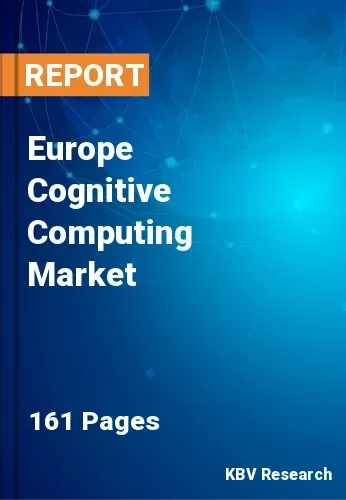The Europe Cognitive Computing Market would witness market growth of 32.0% CAGR during the forecast period (2023-2030).
Cognitive computing's most advanced use is discovery. Understanding a lot of knowledge, acquiring skills, and uncovering insights are all part of the discovery process. These models are based on machine learning without supervision and deep learning. Systems that assist humans in using information more efficiently than they can are needed in light of the ever-growing amounts of data. Although it is very early, some discovery skills have already been developed, and the value cases for potential applications are robust. In order to isolate a significant event and correct the problem, the CIM shell delivers an alert and instantly reconfigures.
The growing demand for big data analytics in various sectors, including IT and telecom, aerospace & defense, and healthcare, is one of the key market drivers. The use of big data analytics is driven by the increasing data volume and the adoption of big data techniques. Data analytics has spread widely and will continue to be essential to new technological developments and creative thinking. However, the data analytics sector is exposed to steadily growing cyber security risks. Cybercriminals now have a new target because of the growth of mobile communications and cloud services. Industry participants will probably emphasize the development of data analytics to filter through network data and foresee security incidents.
Cognitive computing technology is continually evolving and has the potential to revolutionize the way retailers and e-commerce businesses operate. By harnessing the power of AI, machine learning, natural language processing, and data analytics, retailers can gain a competitive edge, improve customer satisfaction, and drive growth in the dynamic and highly competitive retail and e-commerce landscape. Cognitive technologies can make tailored recommendations to customers in retail settings by analyzing basic consumer data as well as specifics of the product they are evaluating. Therefore, with the expansion of the retail sector in this region, the demand for cognitive computing technologies will increase, propelling the market's growth.
The Germany market dominated the Europe Cognitive Computing Market, By Country in 2022, and would continue to be a dominant market till 2030; thereby, achieving a market value of $18,067 million by 2030. The UK market is estimated to grow at a CAGR of 30.9% during (2023 - 2030). Additionally, The France market would exhibit a CAGR of 33% during (2023 - 2030).
Based on Deployment Type, the market is segmented into On-premise and Cloud. Based on Technology, the market is segmented into Natural Language Processing (NLP), Machine Learning and Automated Reasoning & Others. Based on Enterprise Size, the market is segmented into Large Enterprises and Small & Medium-sized Enterprises. Based on Vertical, the market is segmented into Healthcare, BFSI, Retail & E-commerce, Manufacturing, IT & Telecom, Government & Defense, Energy & Power and Others. Based on countries, the market is segmented into Germany, UK, France, Russia, Spain, Italy, and Rest of Europe.
Free Valuable Insights: The Worldwide Cognitive Computing Market is Projected to reach USD 278.8 Billion by 2030, at a CAGR of 32.3%
The market research report covers the analysis of key stake holders of the market. Key companies profiled in the report include SAP SE, Google LLC, Tibco Software Inc., 3M Company, Microsoft Corporation, SAS Institute Inc., TATA Consultancy Services Limited, IBM Corporation, Hewlett Packard Enterprise Development LP, and Oracle Corporation.
By Deployment Type
By Technology
By Enterprise Size
By Vertical
By Country

Our team of dedicated experts can provide you with attractive expansion opportunities for your business.

